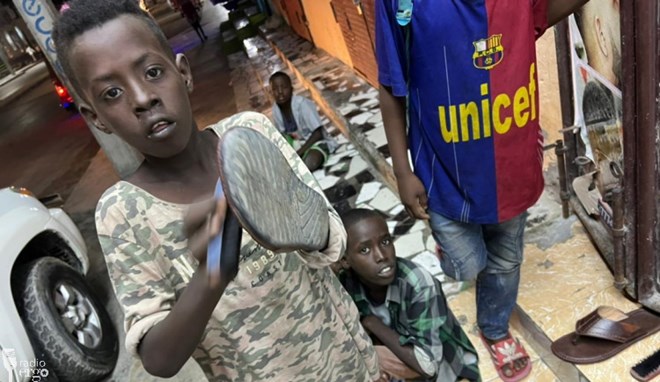
Thursday June 23, 2022

Nur Adan, 12, dropped out of school to work to help his widowed mother raise his younger brothers/Naima Said Salah/Ergo
(ERGO) – At just 16, Somali teenager Samsam Jibril Ahmed is bearing the heavy burden of providing for her drought-impoverished family of 11 people in an internal displacement camp in the capital Mogadishu.
Working as a house help on wages of $20 a month, her job helps the family to cook two meals a day, albeit irregularly. Her four younger brothers, aged four to eight years old, have been sent out into the streets as shoe shiners, bringing home at most two dollars a day to supplement Samsam’s earnings.
Samsam was a class three pupil and her siblings were in an integrated school with secular and Koranic classes back home in Qoryoley in Lower Shabelle, where their entire herd of 50 goats died in the drought forcing them to flee.
She feels upset seeing her age mates dressed in uniform going or returning from school in Alfirdows camp in Mogadishu’s Deynile district, where they arrived in January, and blames herself for her younger brothers’ situation.
“If I could afford to pay their school fees, I would have enrolled them in school, but I don’t have that money. Every time I see my brothers leaving home carrying their shoe shine equipment, I hide myself and cry,” she said.
Samsam, the second born, hoped life would change for the family on reaching Mogadishu. Better off relatives gave them 150,000 Somali shillings to travel to Deynile, where a host family in the camp asked them to contribute to the rent or vacate as they could not bear the burden. They traced their paternal relatives to Kahda district, where they were given a two-roomed corrugated iron house to live in.
“On some days we sleep hungry, other times we cook dry rice without vegetables. Meat is a luxury in our home,” Samsam said.
As the ongoing drought destroys traditional livelihoods and forces more families into destitution, more children are having to shoulder the burden of making money instead of going to school.
Nur Aden, 12, whose family moved from Dhobley in Lower Shabelle, is also working as a shoe shiner making around five or six dollars a day. His widowed mother is earning around three dollars taking on laundry jobs.
Nur, the first born in his family, told Radio Ergo that he decided to take on the job after his father died in January. His father, who worked as a builder, was the sole provider for the family.
Nur’s family lives in a two-roomed rented house in Darawishta IDP camp in Sayyidka neighbourhood paying $30 rent.
“The money my mother and I make buys us only food and basic necessities. We need clothes and shoes like any other children but our money is not enough,” he said.
On Fridays, he sits by the door of the Isbaheysiga Mosque to clean the shoes of worshippers. He makes nine dollars on Fridays as it is busy. He manages to save two dollars a week to pay the eight-dollar Koranic school fees for his four younger siblings.
Nur was studying at a private school in Darawishta camp, but four days after his father’s death he left school to help his mother in raising his younger brothers.
Rahma Hassan Hussein, 13, was sent to Mogadishu by her family in Dinsor, Bay region to work as a house help. She travelled with other displaced families fleeing the drought in the rural areas of the region. Working as a live-in maid in Sayidka neighbourhood, she sends the $60 she earns a month to her family of 13 in Dinsor.
Her family sent her to Mogadishu after losing eight of 12 goats they herded as well as their one-hectare farm to drought.
“There is a severe drought back there and the prices of basic commodities have become expensive. My family has no other source of income and I am the only one who provides for them.”
“You can understand the pressure, I don’t save anything from my salary, I send all of it to them,” Rahma said.